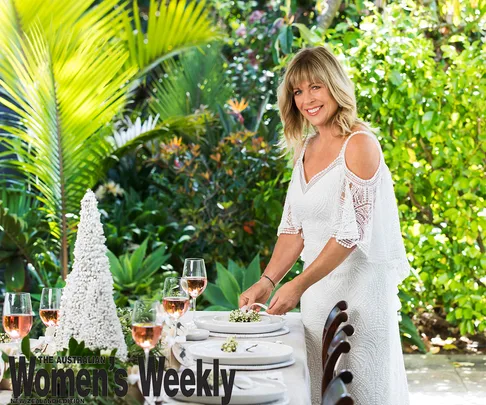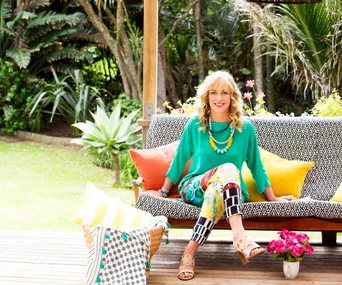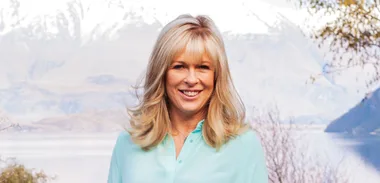On the day of our Australian Women’s Weekly photo shoot, it’s beginning to look a lot like Christmas in the Langbein household: an enormous cake, a festive table-setting, a series of beautiful dresses.
Annabel has fake-tanned that morning and is growing concerned at how deep the colour is turning as the day progresses.
We pause for tea and scones, a ritual that is taken very seriously. There is a decades’ old Chinese teapot, and a rattan warmer basket that keeps it hot between pours. Annabel’s teacups are floral, vintage and beautiful – passed down through the generations (which ensures we hold them very, very carefully).
It’s a beautiful sunny day and the mood is festive. Which is good, because Annabel is a very Christmassy person.
In fact, when it comes to her and her beloved husband Ted, it’s probably the one area where they have to agree to disagree.
“I grew up in a house where everything was over-the-top Christmas,” she says. “My mother would be cooking for weeks and weeks. Whereas Ted’s family don’t really ‘do’ Christmas. I was like, ‘Well, this isn’t going to work.’ So he’s had to, over the years, put up with the fact that I’m not going to be happy with a sausage on the beach.”
When it comes to getting into the Christmas spirit, Annabel – like her mother before her – starts with the baking.
“My mother had this recipe called ‘Kisses’, and when she made them they always looked a bit like coconut-covered dog turds,” she laughs. “So I’ve shaped mine differently. But I couldn’t go through Christmas without them.”
There’s a whole host of festive favourites: Swedish sticky buns, Christmas biscuits, cherries, pavlova. And Annabel is a firm believer in having the full cooked bird on the dining table.
“I like the whole shebang and palaver,” she grins.
“I don’t really want it to be modern and new, I want it to be something familiar. So much of life is changing so quickly. Those traditions, and Christmas itself, give us a sense of anchor.”
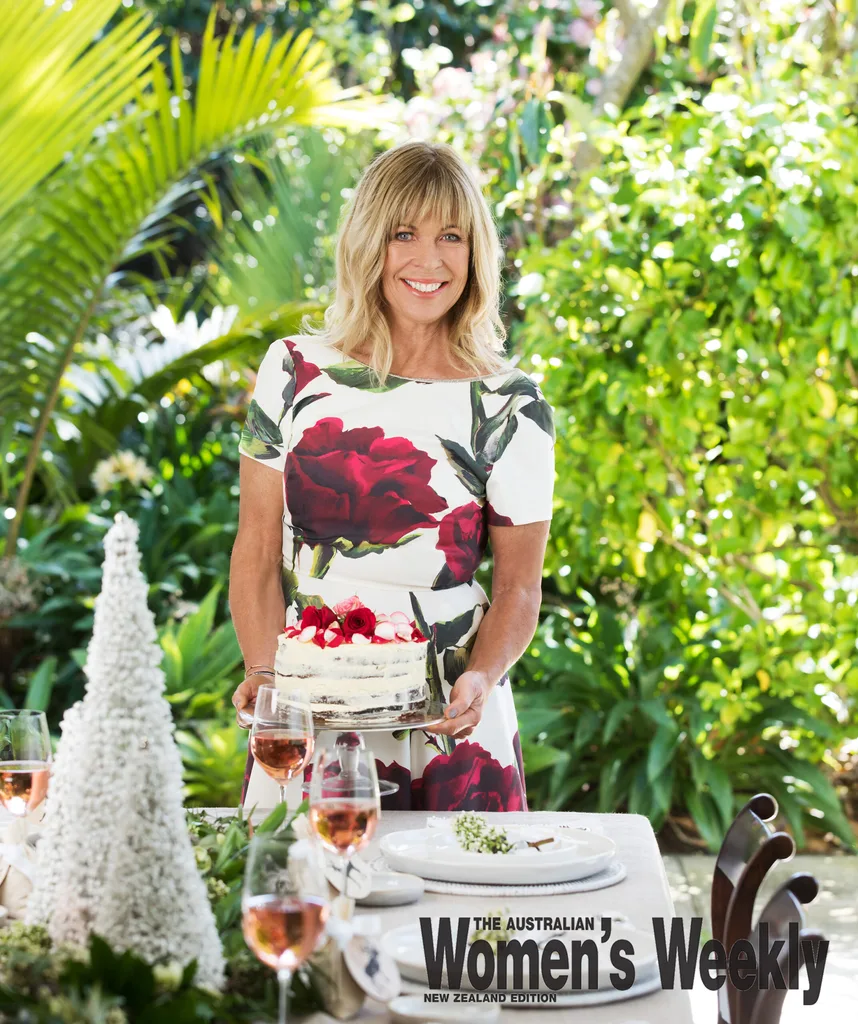
If ever there was a year that the Langbein family needed an anchor or two, it might be this one.
From the tail end of 2017 through to the middle of 2018, Annabel and her family had one life-changing moment after another.
As one of our most successful foodie exports, Annabel is often called upon to do big overseas trips to represent the New Zealand culinary scene. Last November, she was asked by the New Zealand government to run eight different pop-up restaurants in Beijing and Shanghai, showcasing the best Kiwi ingredients for the Chinese audience. Her trip happened to coincide with the sale day, 11/11, when retailer Alibaba does their massive “Singles’ Day” sale in China.
Why is this important, you might ask? Well, Annabel got a very visual demonstration of just what consumer culture looked like when, the day after the record-breaking US$25 billion sales went through, no one could walk down the street because the boxes and boxes to be sent out were piled as high as buildings.
“It actually gave me anxiety,” she recalls. “I thought, ‘This is our culture and a world actually building a sense of self and a sense of belonging around stuff.’ It was overwhelming.”
It also provided a stark contrast with the destination of her next work trip – Antarctica.
Annabel flew down there as a special guest with a team of scientists. The scope and the scale of the massive icy continent, just days after being in the hustle and bustle of some of the most jam-packed streets in the world, was life-changing, Annabel says.
“It sounds very clichéd, but I don’t think I had any idea of how far away it was and how big it was. You arrive on this incredible continent and realise that where you are is just a pinprick.”
Every night on the trip, Annabel would sit across the dinner table from scientists working in climate change, and suddenly all those ideas about sustainability – ideas that Annabel has been working hard to promote throughout her career – were taking on real-life consequences.
“You realise the fragility of the planet… Antarctica really is the canary in the mine. And because you’re there, in this huge, white vastness, things become very clear. It was a surreal experience.”
Returning to New Zealand and the beauty of a Kiwi summer, Annabel was already feeling inspired to channel these learnings into a new project.
“I came back feeling, wow, we’re really lucky – and let’s not stuff it up. How do we make nature stronger and better and what does that look like in our lives? How do we help create road maps for people, where they can live a bit more lightly?”
Annabel’s youngest child Rose, 24, has always been a passionate advocate for all things environmental, and they’d been having lots of long chats around the family dinner table on how they could work in this field together. (As you would imagine, all the good chats in the Langbein household take place around the dining table.)
Then the as yet untitled project had to be put on the back burner when the unthinkable struck.
While down in Wanaka on a weekend home from Melbourne, where she currently lives, Rose flipped off her waterski while on Lake Wanaka and broke her back.
It was a blink-and-you’ll-miss-it crash, as so many of them are.
“I didn’t believe she could have hurt herself so badly,” says Annabel. “And then she said, ‘Mum, I think I’m going to die. My back is so sore.'”
The family got her onto a paddleboard and out of the water, and the volunteer fire brigade and ambulance rushed to the lake’s edge.
“It was a whole day in the ambulance with this kid in excruciating pain. Luckily, she hadn’t hurt her spinal cord. She could have broken her neck or be dead. I mean, this happens – your life can change on a dime.”
The intense shock of having such an accident happen to her daughter caused a flare-up of Annabel’s own long-ago injury. When she was 26 – just two years older than Rose is now – she was flung off a horse and badly broke her back.
“I had this complete flashback… suddenly it was all happening again. I even had the same physical pain in my back.”
On a visit to the doctor, Annabel was diagnosed with post-traumatic stress disorder. It was not an easy start to the year.
Rose was bedridden for months, to give her back the chance to heal.
“I said to her, ‘The funny thing is: there will be a silver lining here.’ Because that’s life. And it’s how you deal with the bad bits that count – we can all deal with the good bits.”
Slowly, the silver lining unveiled itself. Rose and Annabel started working on the project and Rose’s involvement grew and grew – despite having to be lying down for most of it.
“With her having to stay in bed, I ended up being her little slave on the project and testing the recipes for her and going through the process with her,” says Annabel. “It ended up being her vision, and I was able to help her realise her vision. I just went with that, and we ended up creating what I think is the most beautiful project we’ve ever made.”
The result is Together, a collection of recipes that are, as Annabel puts it, “lighter on your pocket, lighter on your waistline and lighter on the planet”.
The mother-daughter duo is immensely proud of it – both consider it their best work – and it’s also indicative of how close their bond is. They only ever occasionally “drive each other exceptionally mad,” Annabel jokes.
Not only was it a great project for Rose to focus on, it also gave Annabel a new experience of being hands-off.
“I don’t know if it’s because it’s family, but it gave me a different model: I didn’t have to do it all. Prior to that, I’d written every single recipe or every piece of copy; it was the only way I could do it so that it felt very true.”
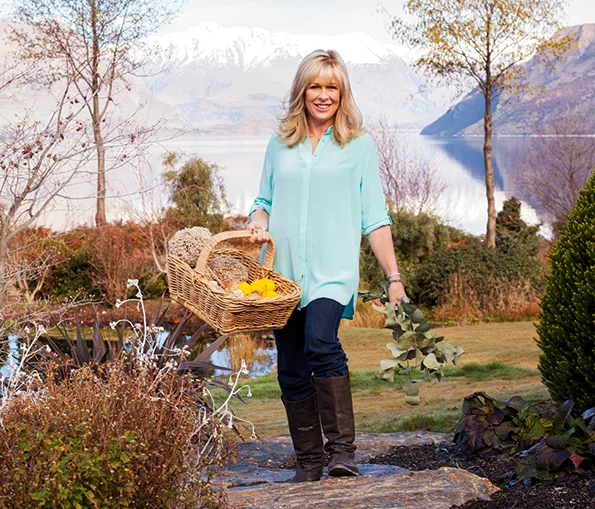
Heading towards the simple life – or, at least, a simpler life – has been a recurring theme for Annabel in the past few years.
Now that Rose and their son Sean have left home, she and Ted spend most of their time in Wanaka, in their small but beautifully formed house; she estimates they had just 20 days up in Auckland last year.
So they decided to downsize their home lives, moving from their large Auckland home into the small photography studio they had built out the back. The main house is now rented out, with Annabel and Ted turning the office space in the studio into a master bedroom.
It is light, bright and filled with sunshine, a perfect size for the two of them. “I love it, I love being here more than being in the big house,” Annabel says.
“It was a really interesting thing, clearing out our house. You just go, ‘Why do we have so much stuff?’ I reckon that any money I’ve made over the years, I’ve spent on books, because I realised I had over 5000 books.”
Reducing the amount of stuff in the house in Wanaka is much easier, Annabel says, because of the isolated area they live in. They can’t just run down to the shops when they need something, so they tend to eat a more vegetable-centric diet that mostly comes from their gardens.
There’s no real need for flash clothes, because they don’t go out as much. But the biggest drawcard of life down south is the community they’ve built around them.
“One of the things that happened when Rose had her accident was the fire brigade came in – and they’re a volunteer brigade. They can get that call any time of day, it doesn’t matter if it’s 3am; they have to sleep with their uniform beside them.”
Annabel decided to film the team doing a training exercise, to draw more attention to the work they do. There were two women on the team, one of whom had two kids and told Annabel she volunteered to show her girls that they could do anything.
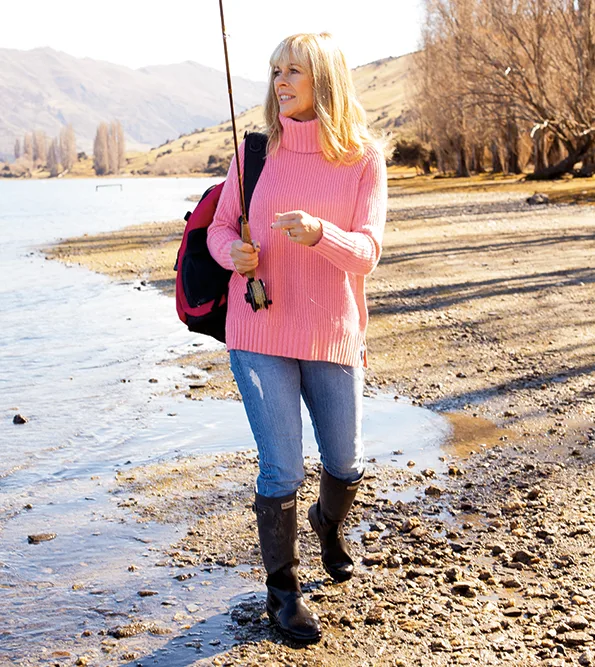
Using her status to shine a spotlight onto areas that need more attention is one of the joys of Annabel’s life now.
“You suddenly reach a stage where you can do what you want. You have your first third, your middle third and your next third, and I don’t know if I’m at my next third, or my next quarter, but I am at the point where I think, ‘What can I do to give back?’ I like communicating, so maybe that’s my biggest skill. Sure, I’ll bake a cake for someone, but I like to be able to take it further. If we all do a little bit, and we all look out a little more for each other, it’s more rewarding. The world is a much better place when we look after each other.”
Small changes that make a big difference is the key, Annabel believes.
The stark, surreal nature of Antarctica – and the possible, if not probable, catastrophic climate changes that lurk around the edges of it, left her feeling overwhelmed by what the future could hold.
But it was an American scientist, also on the trip, who gave her a piece of hope. “He said that if each of us made just a two per cent change in our life, we could make a difference.”
No plastic, choosing sustainable fish species, eating more veges… these are all the small changes Annabel has made in the past year – easy, everyday choices. Not to mention downsizing into a smaller house.
But rather than finding her life lacking because of it, Annabel believes life is just getting better and better – a healthy and happy family being the biggest blessing of all.
“I don’t think either my husband or I had ever thought about this stage of our lives, once the kids had moved out. How fun it could be. I’m still working really hard, and Ted is too, but now with our kids out living their lives, we’re back to almost what it was like when we were dating. But now, you never take it for granted. Because everything can change on a dime, and it is a little miracle of a thing, life.”
